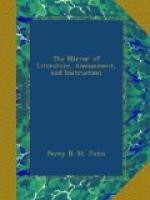in the creation, in the government, and in the redemption
of the world. Language itself indicates, that
the whole system of moral rectitude is comprised in
it—
[Greek: energetein], benefacere,
beneficencethe generic term being, in common parlance,
emphatically restricted to works of charity.
Nor was this mere theory in Parr. Most men who
have been economical from necessity in their youth,
continue to be so, from habit, in their age—but
Parr’s hand was ever open as day. Poverty
had vexed, but had never contracted his spirit; money
he despised, except as it gave him power—power
to ride in his state coach, to throw wide his doors
to hospitality, to load his table with plate, and his
shelves with learning; power to adorn his church with
chandeliers and painted windows; to make glad the
cottages of his poor; to grant a loan, to a tottering
farmer; to rescue from want a forlorn patriot, or a
thriftless scholar. Whether misfortune, or mismanagement,
or folly, or vice, had brought its victim low, his
want was a passport to Parr’s pity, and the
dew of his bounty fell alike upon the evil and the
good, upon the just and the unjust. It is told
of Boerhaave, that, whenever he saw a criminal led
out to execution, he would say, “May not this
man be better than I? If otherwise, the praise
is due, not to me, but to the grace of God.”
Parr quotes the saying with applause. Such, we
doubt not, would have been his own feelings on such
an occasion.—
Quarterly Review.
* * * *
*
THE GATHERER
A snapper up of unconsidered trifles.
SHAKSPEARE.
* * * *
*
SONG FROM THE ITALIAN OF P. ROLLI.
Babbling current, would you know
Why I turn to thee again,
’Tis to find relief from woe,
Respite short from ceaseless
pain.
I and Sylvio on a day
Were upon thy bank reclin’d,
When dear Sylvio swore to me,
And thus spoke in accents
kind:
First this flowing tide shall turn
Backward to its fountain head,
Dearest nymph, ere thou shall mourn,
Thy too easy faith betray’d.
Babbling current, backward turn,
Hide thee in thy fountain
head;
For alas, I’m left to mourn
My too easy faith betray’d.
Love and life pursu’d the swain,
Both must have the self-same
date,
But mine only he could mean,
Since his love is turn’d
to hate.
Sure some fairer nymph than I,
From me lures the lovely youth,
Haply she receives like me,
Vows of everlasting truth.
Babbling current should the fair
Stop to listen on thy shore,
Bid her, Sylvio, to beware,
Love and truth he oft had
sworn.
T.H.
* * * *
*
THE SPRING AND THE MORNING,




